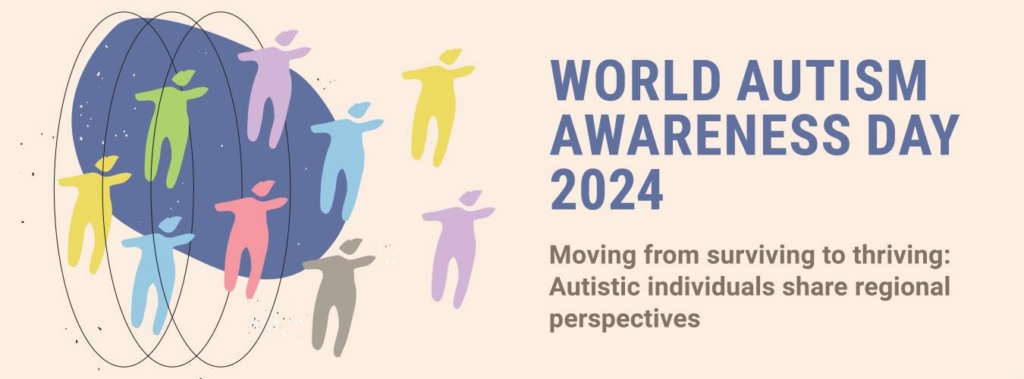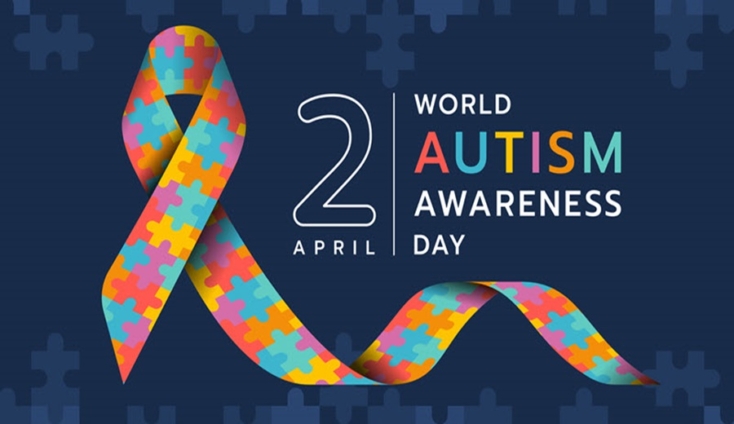In today's world, which champions inclusion, diversity, and equality, discrimination finds no place. This is why I am particularly enthusiastic about this year's theme for World Autism Awareness Day, centered on transitioning from survival to thriving. While acknowledging the substantial progress made, I also recognize the ongoing journey toward greater inclusivity and acceptance.

Since the United Nations General Assembly established 2 April as World Autism Awareness Day (WAAD) in 2007, the UN has consistently observed this day to advocate for the full realization of human rights and freedoms for individuals with autism, on par with everyone else. This progress has been notable, largely due to the dedicated efforts of autistic advocates who have passionately shared their experiences with the broader community. The initial resolution from 2007 underscored the importance of raising public awareness about autism. Over the span of 17 years, our global community has transitioned from merely raising awareness to actively promoting acceptance and recognition of autistic individuals and their valuable contributions to society.
The journey of Autism Awareness extends far beyond a single day of celebration; it requires ongoing dedication to ensure continuity, ultimately propelling the shift from survival to thriving for individuals with autism. As a Speech and Language Therapist based in Ghana, Africa, I am aware of the existing gap between mere survival and flourishing for autistic individuals within our society. Despite notable progress in raising autism awareness in Ghana, there remains a pressing need to solidify these advancements and strive for further success.
Navigating through diverse cultural and religious beliefs, I can confidently affirm that autism awareness has indeed improved in Ghana. However, there is still much work to be done to bridge the gap and foster greater inclusivity and acceptance. In our increasingly interconnected world, characterized by principles of equality, diversity, and inclusion, it is imperative that we continue to nurture these values to ensure that individuals with autism are not just acknowledged but fully integrated and empowered to thrive.
Autism, also known as autism spectrum disorder (ASD), encompasses a diverse range of developmental conditions affecting the brain. The United Nations estimates that approximately 1 in 100 children are diagnosed with autism. It's important to note that the abilities and requirements of individuals with autism vary widely and may change over time. While some individuals with autism can live independently, others may experience severe challenges and necessitate lifelong care and support.
Scientific evidence indicates that multiple factors, including environmental and genetic elements, may contribute to a child's likelihood of developing autism. Extensive research spanning various methodologies and conducted over numerous years has consistently debunked the myth that the measles, mumps, and rubella (MMR) vaccine is linked to autism. Studies that purported such a connection were found to be flawed, with some researchers harboring undisclosed biases that influenced their reporting of the research findings.
As a Speech and Language Therapist, I firmly believe that autism should not be viewed merely as a disability, but rather as a unique condition that warrants specialized attention and care. This year's theme holds significant importance for me, as I regularly work with children and adults with autism in Ghana and beyond. It's crucial to move beyond mere survival and focus on enabling individuals with autism to thrive. As a caregiver immersed in their world day in and day out, I understand the importance of integrating them into society to foster inclusion.
It's paramount that we perceive individuals with autism as individuals with their own unique world, rather than labeling them based on what is considered "normal." Achieving this perspective shift is the first step towards fulfilling the UN's goal of empowering autistic individuals to thrive in our society through inclusivity and diversity.
As speech and language therapists, our central goal is to create an atmosphere in which individuals with autism are embraced and empowered to live fulfilling lives devoid of discrimination and apprehension. Achieving this involves a comprehensive strategy tailored to their unique requirements. This strategy includes interventions such as speech therapy to enhance communication abilities, language therapy to refine comprehension and expression, and social skills training to facilitate meaningful interactions. Through these crucial therapies, our aim is to furnish individuals with autism the necessary skills to navigate daily life confidently and independently.
Besides providing direct therapy, we prioritize educating parents and caregivers about autism spectrum disorder (ASD) and the critical role of supporting their children's progress and maturation. We advocate for parents to offer abundant opportunities for exploration and development, fostering an environment that nurtures self-discovery and individual accomplishments. This approach yields benefits not only for individuals with autism but also contributes to a society that embraces inclusivity, values diversity, and advocates for equal opportunities across the board.
I am a passionate advocate for equal opportunities and inclusion, especially concerning employment for individuals with autism. I strongly believe that establishing inclusive work environments where they can excel and showcase their distinct talents and skills is crucial for their overall welfare and independence. My efforts in fostering understanding, offering comprehensive support, and championing opportunities are aimed at creating a positive impact in the lives of individuals with autism. By empowering them to realize their full potential, I strive to help them lead rewarding and purposeful lives. Autism should not be viewed as just a disability; instead, it represents a distinctive attribute that can lead to remarkable achievements.
Written by: Priscilla Momo Afotey, Freelance Speech & Language Therapist
Contact info: Priscillaafot18@gmail.com || 0594002104/ 050 162 6641
Latest Stories
-
EPA says lead-based paints are dangerous to health, calls for safer alternatives
29 minutes -
Queenmother calls on President-elect Mahama to appoint more women in his government
3 hours -
Atletico Madrid beat Barcelona to go top of La Liga
3 hours -
Usyk breaks Fury’s heart with points win in rematch
3 hours -
Ghana-Russia Centre to run Russian language courses in Ghana
8 hours -
The Hidden Costs of Hunger: How food insecurity undermines mental and physical health in the U.S.
9 hours -
18plus4NDC marks 3rd anniversary with victory celebration in Accra
11 hours -
CREMA workshop highlights collaborative efforts to sustain Akata Lagoon
12 hours -
2024/25 Ghana League: Heart of Lions remain top with win over Basake Holy Stars
13 hours -
Black Queens: Nora Hauptle shares cryptic WAFCON preparation message amid future uncertainty
13 hours -
Re-declaration of parliamentary results affront to our democracy – Joyce Bawah
13 hours -
GPL 2024/25: Vision FC score late to deny Young Apostles third home win
13 hours -
Enhancing community initiatives for coastal resilience: Insights from Keta Lagoon Complex Ramsar Site Workshop
13 hours -
Family Health University College earns a Presidential Charter
14 hours -
GPL 2024/25: Bibiani GoldStars beat Nsoatreman to keep title race alive
14 hours

